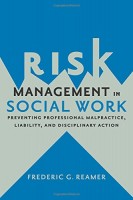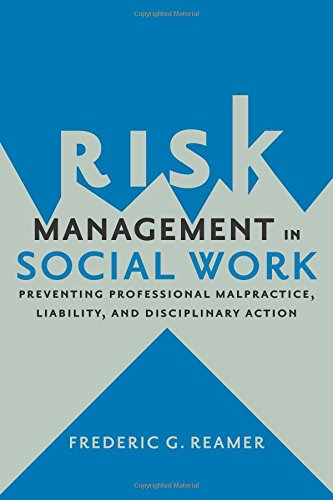 Author: Frederic G. Reamer
Author: Frederic G. Reamer
Publisher: Columbia University Press – 367 pages
Book Review by: Paiso Jamakar
There are large costs – in money, time, effort, damage to reputation, and emotional suffering – for social workers who get sued by their clients or are named as respondents in licensing board complaints.
And some of the social workers who pay these costs did nothing wrong, but unfortunately became victims of the recipients of their services.
While social work is a profession that – like other care-giving endeavors which bring about great psychic satisfaction in helping people better their lot – can also be a minefield with dangerous traps.
The good news however is that few social workers are named as defendants in lawsuits or respondents in licensing board cases, the author points out. He writes that the vast majority of them “practice ethically and competently, adhering to widely-embraced standards of ethics and social work practice designed to protect clients.”
This book helps fill the need for training to help social workers avoid malpractice claims and licensing board liabilities. This aspect of social work practice is called “risk management,” which is part of the title of this book.
Frederic G. Reamer, who has collected information from more than one hundred court cases and licensing board complaints in which he served as an expert witness or consultant, lays out and explains the many warning signs and cautions for social workers, with extensive coverage in several aspects of this field of work, as shown below in the Contents section of this book:
- Professional Risk Management: An Overview
- Confidentiality and Privileged Communication
- The Delivery of Services
- Impaired Social Workers
- Supervision: Clients and Staff
- Consultation, Referral, Documentation, and Records
- Deception and Fraud
- Termination of Service
- Responding to Lawsuits and Ethics Complaints: The Role of Prevention
The best way to convey to you the importance of this work to you, if you are in the field of social work, is to give you a real-life example from this book.
Suppose you are a social worker employed at a mental health center. Your client is a 26-year-old man referred to you by a psychiatric hospital where he is being treated for depression. You have helped this man get a job, hold it, and live independently in his own apartment.
He is romantically involved with a woman who is also a patient at the same mental health center.
You get a call one afternoon and the 26-year-old man says in a fearful voice that he must see you first thing next morning. When he arrives to see you, he looks very distressed. Then he tells you that he has been tested positive by his doctor to have the HIV virus that causes AIDS. He tells you he is shocked by this discovery and he is convinced that his girlfriend infected him with HIV.
Your client is furious and begins to rant about his girlfriend. He keeps on ranting and then says: “She is going to pay for this. She is really going to pay for this!” After this your client storms out of your office. You wonder, shaking, how and to what extent he intends to harm his girlfriend, who also happens to be your client. And you fear if and how you will be liable for whatever happens.
This is the one guide that you can use to know your rights; and use it to insulate yourself, now that you are “armed” with this weapon of self defense and prevention of potential harm to you. This book is a valuable one.
Author:
Frederic G. Reamer is professor at the School of Social Work, Rhode Island College. His many books include Social Work Values and Ethics, Boundary Issues and Dual Relationships in the Human Services, Tens in Crisis: How the Industry Serving Struggling Teens Helps and Hurts Our Kids (with Deborah H. Siegel), and Criminal Lessons: Case Studies and Commentary on Crime and Justice.







